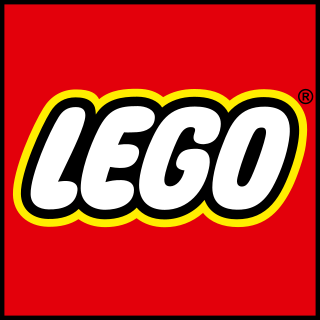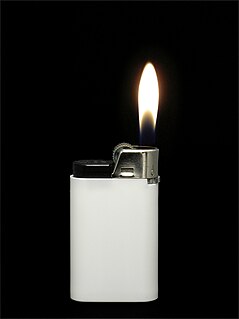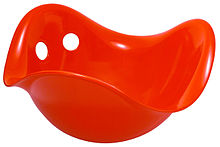
Lego is a line of plastic construction toys that are manufactured by The Lego Group, a privately held company based in Billund, Denmark. The company's flagship product, Lego, consists of colourful interlocking plastic bricks accompanying an array of gears, figurines called minifigures, and various other parts. Lego pieces can be assembled and connected in many ways to construct objects, including vehicles, buildings, and working robots. Anything constructed can be taken apart again, and the pieces reused to make new things.

The toy piano, also known as the kinderklavier, is a small piano-like musical instrument. Most modern toy pianos use round metal rods, as opposed to strings in a regular piano, to produce sound. The US Library of Congress recognizes the toy piano as a unique instrument with the subject designation, Toy Piano Scores: M175 T69. The most famous example of a dedicated composition for the instrument is the "Suite for Toy Piano" (1948) by John Cage.

A toddler is a child 12 to 36 months old. The toddler years are a time of great cognitive, emotional and social development. The word is derived from "to toddle", which means to walk unsteadily, like a child of this age.

Scholastic Corporation is an American multinational publishing, education and media company known for publishing, selling, and distributing books and educational materials for schools, teachers, parents, and children. Products are distributed to schools and districts, to consumers through the schools via reading clubs and fairs, and through retail stores and online sales. The business has three segments: Children Book Publishing & Distribution, Education, and International. Scholastic holds the perpetual US publishing rights to the Harry Potter and Hunger Games book series. Scholastic is the world's largest publisher and distributor of children's books and print and digital educational materials for pre-K to grade 12.
Educational games are games explicitly designed with educational purposes, or which have incidental or secondary educational value. All types of games may be used in an educational environment. Educational games are games that are designed to help people to learn about certain subjects, expand concepts, reinforce development, understand a historical event or culture, or assist them in learning a skill as they play. Game types include board, card, and video games. An educational game is a game designed to teach humans about a specific subject and to teach them a skill. As educators, governments, and parents realize the psychological need and benefits of gaming have on learning, this educational tool has become mainstream. Games are interactive play that teach us goals, rules, adaptation, problem solving, interaction, all represented as a story. They satisfy our fundamental need to learn by providing enjoyment, passionate involvement, structure, motivation, ego gratification, adrenaline, creativity, social interaction and emotion in the game itself while the learning takes place.

A lighter is a portable device used to create a flame, and to ignite a variety of combustible materials, such as cigars, gas stoves, fireworks, candles or cigarettes. It consists of a metal or plastic container filled with a flammable fluid or pressurized liquid gas, a means of ignition to produce the flame, and some provision for extinguishing the flame. Alternatively, a lighter can be powered by electricity, using an electric arc or heating element to ignite the target.

LeapFrog Enterprises Inc is an educational entertainment and electronics company based in Emeryville, California. LeapFrog designs, develops, and markets technology-based learning products and related content for the education of children from infancy through grade school. The company was founded by Michael Wood and Robert Lally in 1994. John Barbour is the chief executive officer of LeapFrog.
The Bobo doll experiment is the collective name for the experiments performed by Albert Bandura during 1961 and 1963 when he studied children's behavior after they watched a human adult model act aggressively towards a Bobo doll, a doll-like toy with a rounded bottom and low center of mass that rocks back to an upright position after it has been knocked down. There are different variations of the experiment. The most notable experiment measured the children's behavior after seeing the human model get rewarded, get punished, or experience no consequence for physically abusing the Bobo doll. The experiments are empirical methods to test Bandura's social learning theory. The social learning theory claims that people learn largely by observing, imitating, and modeling. It demonstrates that people learn not only by being rewarded or punished (behaviorism), but they can also learn from watching somebody else being rewarded or punished. These experiments are important because they resulted in many more studies concerning the effects of observational learning. The new data from the studies has practical implications, for example by providing evidence of how children can be influenced by watching violent media.

The Easy-Bake Oven is a working toy oven which Kenner introduced in 1963, and which Hasbro still manufactured as of late April 2016. The original toy used an ordinary incandescent light bulb as a heat source; current versions use a true heating element. Kenner sold 500,000 Easy-Bake Ovens in the first year of production. By 1997, more than 16 million Easy-Bake Ovens had been sold.

Toy blocks are wooden, plastic, or foam pieces of various shapes and colors that are used as construction toys. Sometimes toy blocks depict letters of the alphabet.

Club Penguin was a massively multiplayer online game (MMO), involving a virtual world that contained a range of online games and activities. It was created by New Horizon Interactive. Players used cartoon penguin-avatars and played in a winter-set virtual world. After beta-testing, Club Penguin was made available to the general public on October 24, 2005, and expanded into a large online community, such that by late 2007, it was claimed Club Penguin had over 30 million user accounts. As of July 2013, Club Penguin had over 200 million registered user accounts.
The 2006 Lebanon War photographs controversies refers to instances of photojournalism from the 2006 Lebanon War that misrepresented scenes of death and destruction in Lebanon caused by Israeli air attacks. As a result of the scandal, Reuters fired freelance photographer Adnan Hajj, and the AP disciplined several others. Reuters also fired a photo editor, and implemented stricter controls on its photo-gathering process.

The OLPC XO, previously known as the $100 Laptop, Children's Machine, and 2B1, is an inexpensive laptop computer intended to be distributed to children in developing countries around the world, to provide them with access to knowledge, and opportunities to "explore, experiment and express themselves". The XO was developed by Nicholas Negroponte, a co-founder of MIT's Media Lab, and designed by Yves Behar's Fuseproject company. The laptop is manufactured by Quanta Computer and developed by One Laptop per Child (OLPC), a non-profit 501(c)(3) organization.

Educational toys are objects of play, generally designed for children, which are expected to stimulate learning. They are often intended to meet an educational purpose such as helping a child develop a particular skill or teaching a child about a particular subject. They often simplify, miniaturize, or model activities and objects used by adults.
A smart toy is a toy which effectively has its own intelligence by virtue of on-board electronics. These enable it to learn, behave according to pattern, and alter its actions depending upon environmental stimuli. Typically, it can adjust to the abilities of the player. A modern smart toy has electronics consisting of one or more microprocessors or microcontrollers, volatile and/or non-volatile memory, storage devices, and various forms of input–output devices. It may be networked together with other smart toys or a personal computer in order to enhance its play value or educational features. Generally, the smart toy may be controlled by software which is embedded in firmware or else loaded from an input device such as a USB flash drive, Memory Stick or CD-ROM. Smart toys frequently have extensive multimedia capabilities, and these can be utilized to produce a realistic, animated, simulated personality for the toy. Some commercial examples of smart toys are Amazing Amanda, Furby and iDog.

K’s Kids® is a developmental toy brand for aged 0-3, the brand has developed TOYS that provide developmental benefits to kids in their early childhood since 1997, selling to 65 countries as of 2017. Receiving over 100 international awards, K's Kids toy is highly recommended by baby experts and marketers and their toys are NOT JUST TOYS but developmental tools for the young masters. K's Kids develops a concept - LEARNING TRIANGLE to explain the benefits of each of their toys. Through PARENTS SUPPORT CENTER, a platform which contains detailed benefits of each of the K's Kids toys, parents understand the goodies and function and learn how to make use of them to develop their kids. K's Kids believes that the world will be better if our next generation grows up with love and care and they are committed to develop TOYS that develop KIDS.

Turbocharged direct injection or TDI is a design of turbodiesel engines featuring turbocharging and cylinder-direct fuel injection that was developed and produced by the Volkswagen Group. These TDI engines are widely used in all mainstream Volkswagen Group marques of passenger cars and light commercial vehicles made by the company. They are also used as marine engines in Volkswagen Marine and Volkswagen Industrial Motor applications.

A playground, playpark, or play area is a place specifically designed to enable children to play there. It is typically outdoors. While a playground is usually designed for children, some target other age groups. Berlin's Preußenpark for example is designed for people aged 70 or higher. A playground might exclude children below a certain age.






















